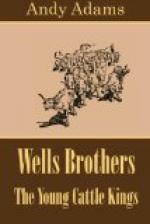Joel cut two car-loads of prime beeves, and then tendered his services to Sargent. The cattle had quieted, and a fifth man was relieved from guarding the round-up, and sent to the assistance of Manly. A steady stream of beef poured out for an hour, when a comparison of figures was made. Manly was limited to one hundred and twenty head, completing an even thousand shipped from the brand, and lacking four, was allowed to complete his number. Sargent was without limit, the object being to trim the general herd of every heavy, rough beef, and a tally on numbers was all that was required. The work was renewed with tireless energy, and when the limit of twenty cars was reached, a general conference resulted in cutting two loads extra.
“That leaves the home cattle clean of rough stuff,” said Sargent, as he dismounted and loosened the saddle on a tired horse. “Any aged steers left are clean thrifty cattle, and will pay their way to hold another year. Turn the round-up adrift.”
After blowing their horses, a detail of men drifted the general herd up the creek. Others lent their assistance to the wrangler in corralling his remuda, and after relieving the cutting horses, the beeves were grazed down the valley. The outfit had not spent a night at headquarters in some time, the wagon serving as a substitute, and orders for evening freed all hands except two men on herd with the beeves.
The hurry of the day was over. On securing fresh horses, Joel and Sargent turned to the assistance of the detail, then drifting the main herd westward. The men were excused, to change mounts, and relieved from further duty until the guards, holding the beeves, were arranged for the night. The remnant of the herd was pushed up the creek and freed near Hackberry Grove, and on returning to overtake the beeves, the two horsemen crossed a spur of the tableland, jutting into the valley, affording a perfect view of the surrounding country.
With the first sweep of the horizon, their horses were reined to a halt. Fully fifteen miles to the northeast, and in a dip of the plain, hung an ominous dust cloud. Both horsemen read the sign at a glance.
Sargent was the first to speak. “Dell met the herd on the Republican,” said he with decision. “It’s the Stoddard cattle from Ogalalla. The pitch of their dust shows they’re trailing south.”
The sign in the sky was read correctly. The smoke from a running train and the dust from a trailing herd, when viewed from a distance, pitches upward from a horizon line, and the moving direction of train or herd is easily read by an observant plainsman. Sargent’s summary was confirmed on reaching headquarters, where Dell and the trail foreman were found, the latter regaling Manly and others with the chronicle of the new trail.




